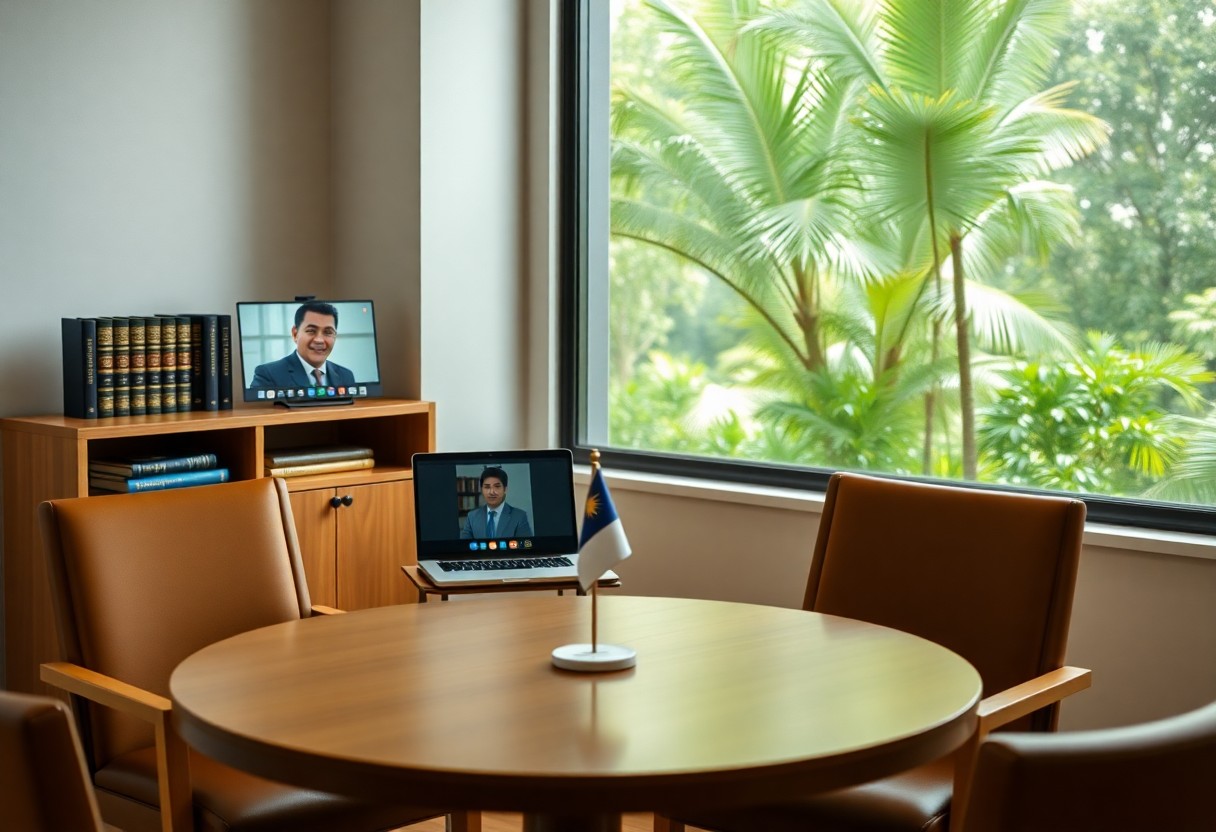Navigating the Legal Landscape of Divorce in Malaysia
Understanding Malaysian Divorce Laws
In Malaysia, divorce laws vary depending on whether the marriage is registered under civil or Islamic law. If you’re looking to file for divorce while your spouse is overseas, the process involves submitting your application to the appropriate court based on your marriage type. For civil marriages, you may file in the High Court, while Islamic marriages require the Syariah Court. The law mandates a minimum separation period of two years before filing for divorce unless you can prove unreasonable behavior or other significant grounds.
Jurisdiction and Local Regulations
Establishing jurisdiction is vital for divorce proceedings. If your spouse resides overseas, the court may still have jurisdiction if you are currently residing in Malaysia. This allows the court to divide assets and issue orders for child custody. However, if your spouse is abroad and contests the proceedings, it complicates matters. You may need legal representation familiar with both local and international law to navigate potential cross-border legal issues, such as asset distribution in different jurisdictions.
Key Takeaways:
- The divorce process can be initiated in Malaysia even if one spouse is overseas.
- Jurisdiction for divorce typically lies in Malaysia, provided one spouse is a resident.
- Court proceedings can be conducted via electronic means in some cases.
- Service of legal documents may need to comply with international laws and foreign court requirements.
- Participation of the overseas spouse may be facilitated through video conferencing.
- It’s advisable to seek legal counsel familiar with cross-border divorce matters.
- Enforcement of custody and maintenance orders can be complicated across jurisdictions.
Initiating the Divorce: Key Documents and Processes
To initiate a divorce while your spouse is overseas, you must gather specific documents and adhere to precise processes. This involves filing a petition in the appropriate Malaysian court and ensuring all necessary documentation is correctly prepared. The court will require evidence of your marriage, grounds for divorce, and any related financial or custodial details. Be diligent in complying with local laws to avoid delays in the proceedings.
Required Documentation for Overseas Spouses
Your requirements include a certified copy of your marriage certificate, your spouse’s overseas address, and proof of your current residency. Additionally, you may need identification documents such as your MyKad or passport. If children are involved, custody details should also be included. Make sure to provide accurate and complete information to streamline the process.
Servicing Divorce Notices Internationally
Servicing divorce notices to your spouse overseas can entail utilizing international agreements such as the Hague Convention. This ensures your spouse receives the notice through lawful channels. It’s vital to provide the correct jurisdiction and follow prescribed methods for serving documents, as failure to do so may lead to complications in the divorce process.
Once you initiate the service of divorce notices internationally, timelines may vary based on the country your spouse resides in. Procedures often involve translating documents into the local language and sending them through designated authorities or legal services familiar with international protocols. You have to track the service meticulously to ensure it is completed, as any discrepancy can jeopardize your proceedings and extend the duration significantly. Engaging a legal professional experienced in international divorce cases can aid in navigating these complex requirements efficiently.

The Role of Malaysian Courts in Cross-Border Divorces
The Malaysian courts play a vital role in cross-border divorces, ensuring that legal proceedings are fair and adhere to the country’s laws while accommodating international dynamics. Cases involving overseas spouses require the courts to navigate complex issues such as jurisdiction, the applicable law, and the enforcement of orders across borders.
Understanding Jurisdictional Challenges
Jurisdictional challenges arise when determining which court has the authority to hear your divorce case. Factors such as your domicile, the duration of your marriage, and the location of your spouse can complicate this process. Malaysian courts will assess these elements to ensure they possess the requisite jurisdiction to adjudicate your case.
How the Courts Handle Absentee Spouses
When one spouse is absentee, Malaysian courts may still proceed with divorce proceedings under specific conditions. The court typically requires adequate evidence that reasonable attempts to notify the absent party have been made, such as sending notifications via registered mail or publishing announcements in local newspapers.
If your spouse is absentee, the court may allow you to proceed with the divorce after establishing they have been properly notified. The court often relies on documentation like affidavits confirming these attempts, which can include emails or social media messages indicating your efforts to reach your spouse. Ultimately, the goal is to ensure the process upholds the principles of fairness while also adhering to procedural laws, enabling you to obtain a legal divorce even if your spouse is not present.

Alternative Resolution Methods: Mediation and Arbitration
Mediation and arbitration provide alternatives to traditional litigation in divorce cases, especially beneficial when a spouse is overseas. These methods encourage amicable solutions and can significantly reduce the time and costs typically associated with court proceedings. Mediation involves a neutral third party facilitating discussions between you and your spouse, while arbitration involves a binding decision from an arbitrator. Both options can streamline the divorce process and lessen the emotional toll on the involved parties.
Benefits of Mediation for Expedited Divorce
Mediation offers numerous advantages for expediting your divorce, especially when communicating with an overseas spouse. By fostering open dialogue, mediation can lead to faster resolutions on key issues, such as asset division and child custody. It allows you to maintain control over the outcome, reducing the likelihood of prolonged litigation. Furthermore, the confidentiality of mediation can encourage more constructive discussions, leading to mutually agreeable terms without the public scrutiny of court proceedings.
Considerations for Arbitration in International Cases
Arbitration presents unique considerations in international divorce cases, particularly regarding jurisdiction and enforceability of decisions. The arbitration agreement must be clearly defined and mutually accepted by both parties, outlining the specific procedures to be followed. You should also consider the legal frameworks of both Malaysia and your spouse’s country, as differing laws may impact the recognition of arbitration outcomes. Hiring legal experts familiar with international laws can help navigate these complexities.
In international arbitration, the selection of an arbitrator can significantly influence the process. Look for professionals with experience in family law and an understanding of cross-border issues, as their expertise can help ensure a fair and informed decision-making process. Additionally, consider the implications of the venue for arbitration; the location can affect the procedural rules governing your arbitration. Effective communication with your overseas spouse is also vital, particularly in coordinating schedules and understanding each party’s expectations during the arbitration process. Engaging with a professional arbitrator experienced in international family law will facilitate a smoother experience and increase the likelihood of reaching a satisfactory resolution.

Financial Implications and Support: What You Need to Know
The financial implications of divorce can be complex, especially when one spouse resides overseas. You must navigate not only the division of assets but also ensure fair support arrangements for children and spousal maintenance. Understanding local laws and international treaties is vital to achieving a favorable financial outcome.
Division of Assets and Liabilities Across Borders
Asset division in cross-border situations requires thorough consideration of legal frameworks in both countries. You may find that certain assets, such as real estate or bank accounts, are subject to varying laws. Engaging legal professionals familiar with international property rights can help ensure that your interests are adequately protected.
Spousal and Child Support Considerations for Overseas Families
Determining spousal and child support while one spouse lives overseas can pose challenges. Obligations often depend on the jurisdiction in which you file for divorce, which can affect enforcement and calculations of support amounts. Each country has different guidelines for support, which may impact your financial agreements and negotiations.
For instance, if you are seeking child support, you will need to consider the laws in both Malaysia and the overseas country where your spouse resides. Various international treaties, such as the Hague Convention on Child Support, may facilitate the enforcement of support orders. Additionally, factors like your spouse’s income and living conditions in their new country will influence the amount and duration of support payments. Clear documentation and legal advice are vital in securing a settlement that meets the needs of your family.
Ensuring Enforceability and Compliance Post-Divorce
After finalizing the divorce, ensuring that both parties adhere to the decree is vital for a peaceful transition. Establishing clear terms within the divorce agreement minimizes potential disputes. Consider consulting a legal professional to draft enforceable provisions addressing child custody, property division, and financial support, which can streamline compliance and provide clear recourse in case of violations.
Recognizing Foreign Divorce Decrees in Malaysia
Malaysia recognizes foreign divorce decrees under conditions outlined in its private international law framework. A foreign divorce can be considered valid as long as it was obtained according to the laws of the jurisdiction where the divorce occurred. Key factors include the proper jurisdiction of the court and compliance with any applicable treaties or bilateral agreements between Malaysia and the foreign country.
Steps to Take If Your Ex-Spouse Fails to Comply
If your ex-spouse fails to comply with the divorce decree, you have several options available. Begin by documenting the non-compliance, including any missed payments or violations of custody arrangements. Next, seek legal redress in Malaysia through the Family Court, which can enforce compliance by issuing orders or sanctions against the non-compliant party, potentially leading to financial penalties or modified custody arrangements.
In instances where your ex-spouse continuously disregards the court order, you may need to file a formal application in court to enforce the decree. Depending on the severity and circumstances, the court can compel compliance, which may include garnishing wages or holding your ex-spouse in contempt of court. Collecting evidence of non-compliance, such as missed support payments or refusal to honor custody agreements, strengthens your case and supports your pursuit of enforcement remedies.
Final Words
Conclusively, navigating the divorce process in Malaysia while your spouse is overseas can be complex, yet it is manageable. You must file your petition at the appropriate court, and your spouse will need to be served with divorce papers through legal channels applicable for overseas individuals. Make sure to provide relevant documentation to support your case, and consider using legal assistance to ensure that all procedures are correctly followed. Understanding these steps will help facilitate a smoother resolution to your marital status despite geographical challenges.
FAQ
Q: Can I file for divorce in Malaysia if my spouse is living abroad?
A: Yes, you can file for divorce in Malaysia even if your spouse is overseas. The court can still exercise jurisdiction over the case if the divorce petition is filed in Malaysia.
Q: What documents are needed to file for divorce when my spouse is overseas?
A: You will need to provide your marriage certificate, identification documents, and any evidence related to the grounds for divorce. If your spouse is unreachable, proof of attempts to contact them may also be required.
Q: How will I serve the divorce papers to my spouse living abroad?
A: Divorce papers can be served through international courier or by sending them to your spouse’s last known address. The Malaysian court may also allow service through the foreign court where your spouse resides.
Q: What happens if my spouse does not respond to the divorce petition?
A: If your spouse does not respond, you may proceed with an application for a divorce based on their default. The court can grant a judgment without their participation if it deems the application valid.
Q: How long does the divorce process take if my spouse is overseas?
A: The duration varies based on several factors, including the complexity of the case, the responsiveness of both parties, and court schedules. Typically, it may take several months to finalize.
Q: Can I apply for maintenance or child custody while my spouse is overseas?
A: Yes, you can apply for maintenance and child custody as part of the divorce proceedings. The court will consider the welfare of the children and financial circumstances during this process.
Q: Do I need a lawyer to file for divorce in Malaysia if my spouse is overseas?
A: While it is not mandatory to have a lawyer, having legal representation can help navigate the complexities of the divorce process, especially when dealing with an overseas spouse.
